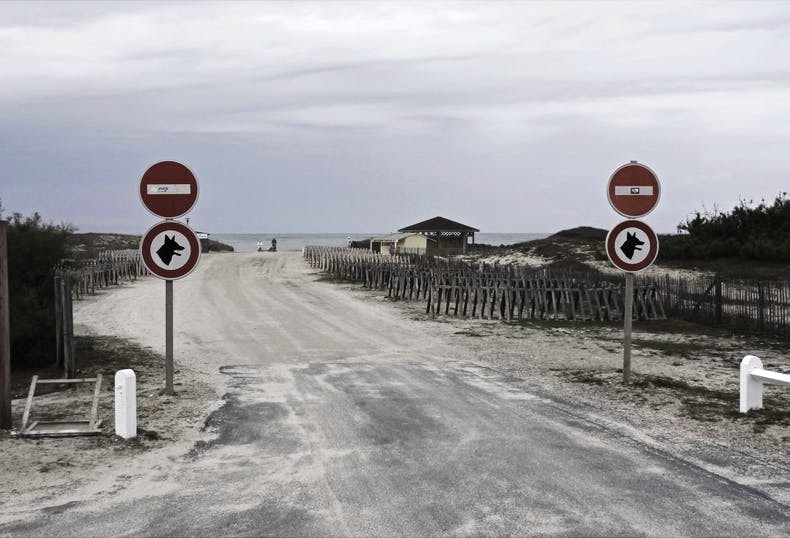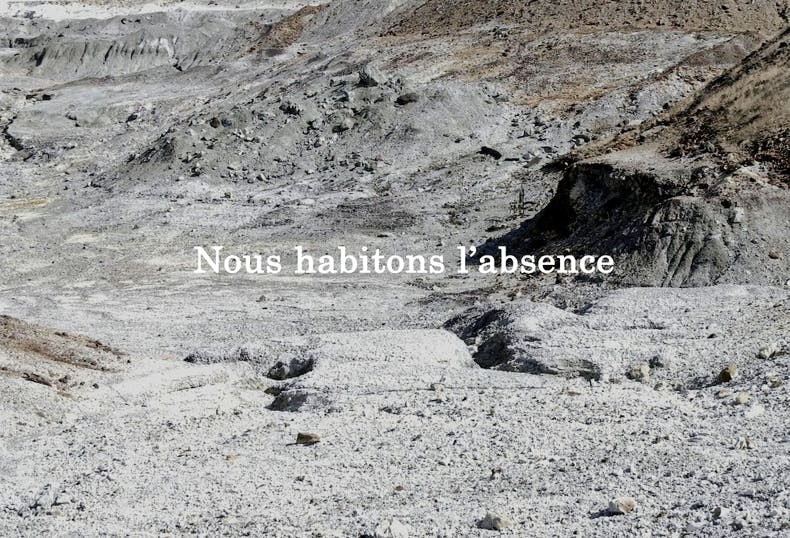The following was originally published by francinter.fr as Michel Houellebecq's first written response to the pandemic—or rather response to the responses of his peers. In what follows, the French novelist recuses the idea of a new world arriving in the wake of the coronavirus crisis and calls attention to both the bureaucratic isolation of this virus-time and invisibility of its form of death. (Transl. John Kelsey)
Editorial note: Houellebecq, both through his novels and public commentary, has become one our era's most polarizing literary figures. His 2019 novel Seratonin was awarded France's highest national distinction, the Légion d'honneur only to be interpreted as presaging the gilets jaunes movement (it was written prior to the protests) and even stoking the Islamophobia and racism driving nationalists interests in France and across the West. Houellebecq's defenders note he is shining a light on the failure of neoliberal policies. What is interesting perhaps, in Houellebecq's thoughts that follow, is how unsensational the prescient pessimist imagines our post-virus future to be. Tempering the more exciting, cinematic observations of his peers, he points to a disease that spreads without intimacy, a writer without an environment to walk through, a pandemic without images, deaths without witnesses—as bad as the present, he writes, just a little bit worse.

Responses to some friends
We must admit: the main point of most email exchanges these last few weeks has been to confirm that one’s interlocutor isn’t dead or dying. But then we try to say some interesting things anyway, which isn’t easy in the midst of an epidemic that proves to be just as boring as it is worrisome. A banal virus, really not so different from any flu virus, but with unknown survival conditions, vague symptoms, sometimes benign and sometimes deadly, and not even sexually transmissible: in short, a virus without qualities. And while this epidemic can easily cause several thousand deaths in the world each day, it meanwhile produces the curious impression of being a non-event. In any case, my respected colleagues (some, anyway, are respectable) weren’t really talking about the thing itself: they preferred to deal with the problem of confinement, and here I would like to add my two cents to their observations.
Frédéric Beigbeder (of Guéthary, Pyrénées-Atlantiques). For a writer who doesn’t get out so much anyway, who lives like a hermit with his books, confinement doesn’t bring much of a change. Yes okay, Frédéric, in terms of social life there’s hardly any difference. But there’s one point you’re forgetting (no doubt because, living in the country, you’re less under control): a writer needs to walk.
This confinement seems the perfect occasion to dig up the old Flaubert-Nietzsche argument. Somewhere (I forget exactly), Flaubert claims that thinking and writing well only happen when sitting down. Nietzsche with protests and insults (I also forget where), goes so far as to call Flaubert a nihilist (at the time, Nietzsche was using this word for almost anything): he himself had conceived all his works on his feet, and anything not thought up on a walk was garbage, and furthermore he’d always been a Dionysian dancer, etc. Without any exaggerated sympathy for Nietzsche, I must however recognize that in this case he’s totally right. Trying to write without any possibility, at some point in the day, of spending a few hours walking in a steady rhythm, is strongly inadvisable: accumulated nervous tension has no way of dissipating; thoughts and images continue to spin painfully in the author’s poor head, quickly making him irritable, if not mad.
The only thing that really helps is the mechanical, machine-like rhythm of walking, not for generating new ideas (although this can happen too) but first and foremost for calming the conflicts induced by the shock of ideas born at the worktable (and here, Flaubert was not entirely wrong). But when Nietzsche goes on about the elaborate conceptions born on rocky cliffs outside of Nice or in the prairies of the Engadine, etc, he goes a bit far: unless you’re writing a travel guide for tourists, the landscapes one walks through are less important than the landscape in one’s head.
Catherine Millet (normally quite the Parisian, she happened to be in Estagel, in the East Pyrénées, when the lock-down went into effect). The current situation reminds her unpleasantly of the “speculative” part of one of my books, The Possibility of an Island.

That’s when I realized it’s a good thing to have readers. Because I myself hadn’t made this connection, as obvious as it was. And if I think back on it, this was exactly what I had in mind, concerning the extinction of humanity, when I was writing that book. Nothing like a big budget movie. Rather, something more bleak. Individuals isolated in their cells, living without physical contact, just a few exchanges on the computer… fading out like that.
Emmanuel Carrère (Paris-Royan). Will this situation inspire interesting books in him? He wonders.
I wonder too. I really did ask myself the exact same question but, at the end of the day, I don’t think so. There have been so many books, throughout the centuries, about the plague; writers have always found it interesting. But in this case, I have my doubts. Already I don’t believe for even half a second statements like “After this, nothing will ever be the same.” On the contrary, everything will remain exactly the same. The unfolding of this epidemic has been remarkably normal, even. The West will not be the richest and most developed zone in the world for all eternity, it’s not our divine right. Our story has been over for some time now, this isn’t exactly a scoop. And if we want to go into details: France is a bit better off than Spain and Italy, but much worse than Germany. Here too, no big surprise.
On the contrary, the principal result of the coronavirus has been to accelerate certain mutations that were already underway. For quite a few years now, technological evolutions, whether minor (video on demand, touch-free payment) or major (teleworking, internet shopping, social networking sites) have as their main consequence (or principal objective?) to diminish physical and, above all, human contact. The coronavirus epidemic offers a fantastic justification for a certain obsolescence that seems to affect human relations. Which reminds me of an enlightening comparison I recently came across in an anti-PMA [procréation médicalement assistée] text, “The Chimpanzees of the Future” (I discovered these people on the internet: I never said the internet was entirely bad). I quote: “Soon, having kids freely and by chance will seem as strange as catching a ride without a mobile app. Carpooling, cohabitation: we get the utopias we deserve; okay let’s move on.
It would be no less false to claim that we’ve now rediscovered the tragic, death, finitude, etc. For over half a century now, the tendency—as Philippe Ariès has described so well—has been to hide death as much as possible. And never has death been so discreet as in these last few weeks. People die alone in hospital rooms or in retirement homes, and are immediately buried (or incinerated, which seems so in the spirit of these times), without inviting anyone… in secret. Dying without any witness, victims are then summed up in the statistical unity of daily death tolls. And there’s something strangely abstract about the fear that spreads through the population as this number increases.
Not to mention another number that’s taken on importance in recent weeks: the age of the sick. Up to what age is it appropriate to keep resuscitating and caring for the elderly? 70, 75, 80? Apparently this depends on which part of the world you’re living in. In any case, never before have we communicated with such shameless cool the fact that not everyone’s life is worth the same. That after a certain age (70, 75, 80?), it’s a bit like you’re already dead.
All these tendencies, as I’ve said, were already in effect before the coronavirus: they’ve only become more obvious in this moment. We will not wake up, after our confinement ends, into a new world. It will be the same, but a bit worse.
Translation published 6 May 2020